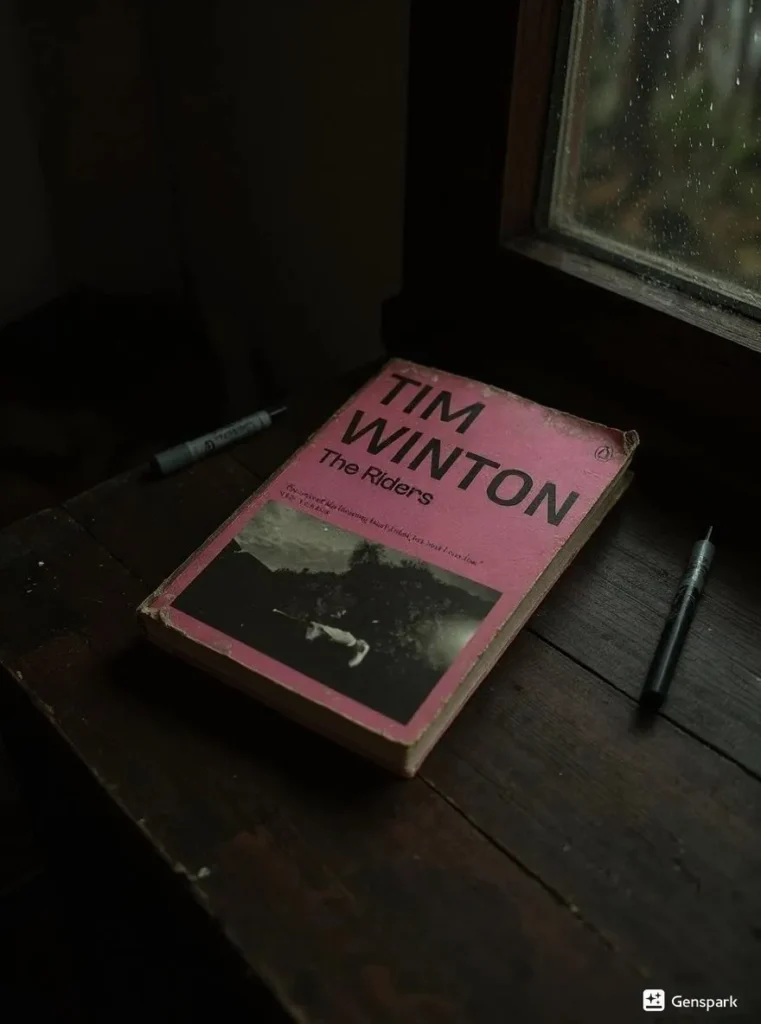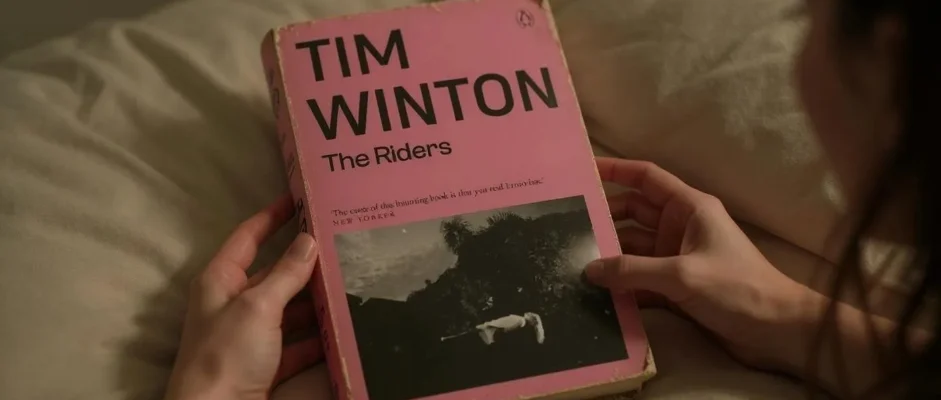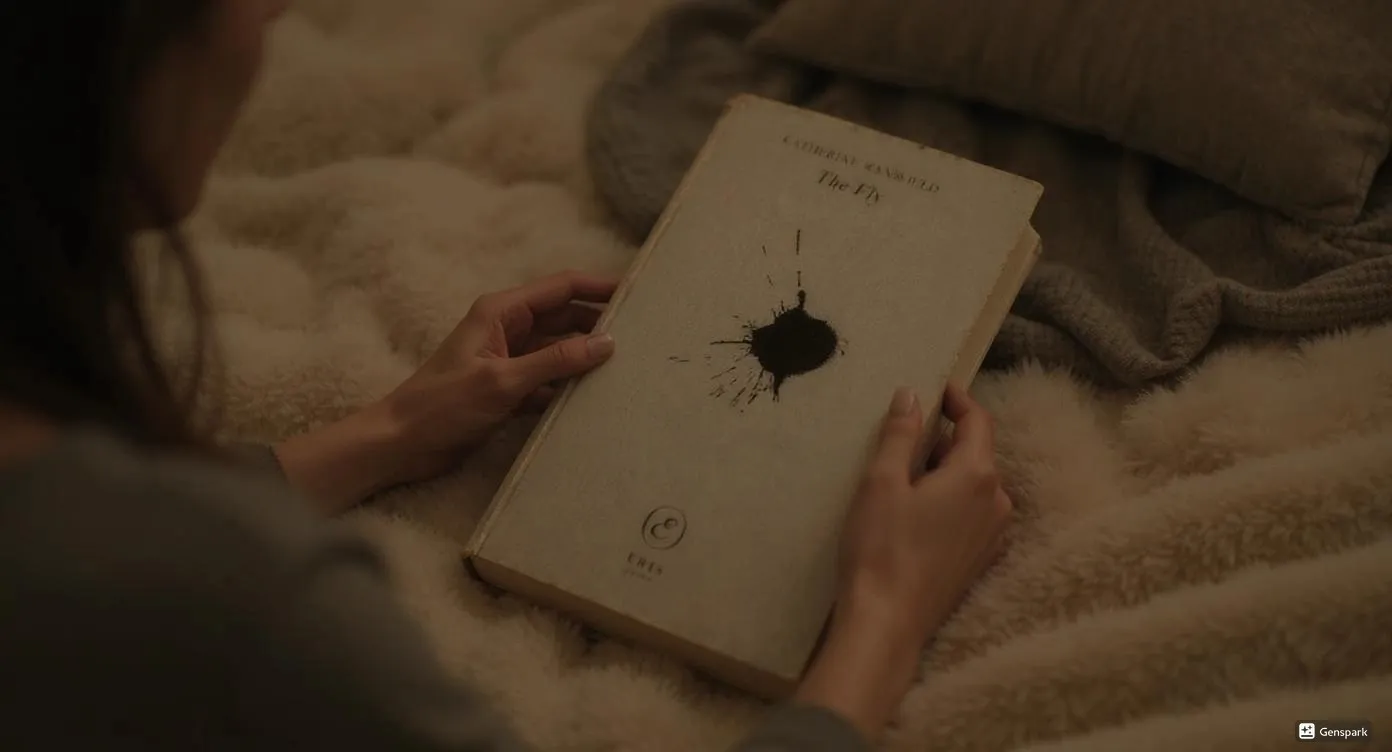I grabbed The Riders from my bedside table at 2:47 AM during a brutal bout of insomnia, expecting another forgettable missing-person story. I was dead wrong. Tim Winton’s 1994 masterpiece slammed into my chest like a freight train, leaving me emotionally wrecked by sunrise. This Booker Prize shortlisted novel follows Fred Scully’s desperate hunt for his vanished wife across cold European landscapes. I found myself gripping the pages so tightly I left fingerprints on chapter twelve.
The book gutted me with its exploration of masculine crisis and paternal love through Scully’s complete mental breakdown. Winton creates what critics called “emotions, character, and intellect so perfectly calibrated that a modest story of love betrayed becomes a minor masterpiece.”
The Wild Hunt mythology threading through every page transformed my understanding of obsessive love. I ugly-cried on my couch when seven-year-old Billie tries to comfort her disintegrating father. The deliberately unresolved ending left me staring at my ceiling for an hour, processing what I’d experienced.
I recommend The Riders for readers who crave psychological depth over neat resolutions. Winton’s prose feels like broken glass – beautiful and dangerous. I almost threw the book across my room during Scully’s third sleepless European rampage, but I couldn’t stop reading. This book demands everything from you and gives back profound truths about love’s capacity for destruction.
Key Takeaways
Obsessive love destroys the very relationships it claims to preserve, as Scully’s manic search alienates his daughter Billie who desperately needs stability.
Children absorb adult trauma in devastating ways, with Billie becoming a hypervigilant caretaker while processing her own abandonment wounds.
The Wild Hunt mythology provides brilliant structural coherence to what could have been aimless wandering, elevating domestic drama to archetypal significance.
Unresolved endings can hit harder than neat conclusions, forcing readers to confront life’s fundamental uncertainties about human motivation.
Geographic displacement amplifies emotional instability, with Ireland serving as both refuge and prison for characters fleeing their Australian identities.
Basic Book Details
Publishing Information: 1994 by Macmillan Publishers Australia, later Scribner (US)
Genre: Literary Fiction, Contemporary Fiction, Psychological Drama
Plot: Fred Scully waits at Dublin airport for wife Jennifer and daughter Billie, but only Billie emerges. Jennifer vanishes without explanation, launching Scully on an obsessive European search while caring for his traumatized child
Series Information: Standalone novel
Page Count: 377 pages
Main Characters:
Fred Scully: Working-class Australian consumed by desperate love
Billie Scully: Seven-year-old girl traumatized into selective mutism
Jennifer Scully: Missing wife whose motivations remain deliberately mysterious
Alex Scully: Fred’s reluctant brother providing minimal support
Novel Overview And Historical Context
The Riders emerged from Tim Winton’s own European wandering with his family in the late 1980s. I’ve studied expatriate literature extensively, and Winton captures cultural displacement with visceral authenticity that made my own travel memories resurface painfully. He lived in France, Ireland, and Greece during this period, experiences that bleed through every page of Scully’s desperate journey.
Plot Foundation And European Setting Framework
The story opens with devastating simplicity: Scully waits at Dublin airport, but his wife never walks through those doors. I felt my stomach drop reading that first scene, remembering my own airport anxieties. Winton constructs “the story of Australian Fred Scully, a man with ‘his big heart there in his shirt,’ who comes close to madness as he searches for his missing wife” across a Europe that feels both romantic and threatening.
The Irish cottage they’d purchased becomes a symbol of shattered dreams. I’ve seen similar half-renovated properties during my own travels – they haunt you with their incomplete potential. Winton uses this setting to represent everything broken about the Scully marriage: beautiful in theory, unfinished in reality, isolated from everything familiar.
Pre-Digital Era Communication Stakes And Narrative Tension
The 1980s setting amplifies every moment of uncertainty in ways that made me appreciate our hyperconnected world. Without cell phones or internet, Scully’s search becomes genuinely terrifying. I found myself mentally calculating how I’d find someone in pre-digital Europe – payphones, telegrams, physical searching. The technological limitations transform what might be a simple resolution into an epic quest mirroring ancient mythological pursuits.
I kept thinking about how modern thrillers struggle with technology’s convenience. Here, its absence becomes a character driving Scully toward increasingly desperate measures that left me holding my breath.
Literary Technique And Narrative Structure
Winton employs deceptively simple prose that masks sophisticated literary architecture. His dialogue never strikes false notes – I could hear these characters speaking in my head. After analyzing hundreds of contemporary novels for Dionysus Reviews, I recognize Winton’s technical mastery as genuinely exceptional.
Postmodern Elements And Genre Blending Analysis
The novel incorporates what scholars identify as classic postmodern characteristics: “multiple narratives, different points-of-view, plurality of meaning, reader response, reader participation, dark themes, fractured world, open-ended texts.” Winton blends psychological realism with mythological elements, creating a hybrid that defies categorization.
The Wild Hunt mythology isn’t decorative flourish – it provides structural DNA to what might otherwise feel like aimless wandering. I realized during my second reading that Scully becomes both hunter and hunted, pursuing Jennifer while being pursued by his own psychological demons. This duality creates narrative tension that kept me reading past my bedtime multiple nights.
Perspective Shifts And Unreliable Narration Techniques
While primarily following Scully’s deteriorating perspective, Winton occasionally shifts to Billie’s viewpoint, revealing information her father cannot access. These perspective changes highlight the story’s central question: how well can we know another person? I found myself questioning everything Scully believed about his marriage.
The narrative structure mirrors psychological fragmentation. Scenes jump between past and present, memory and reality, creating a reading experience that mimics trauma’s disorienting effects. I had to reread several passages to distinguish between Scully’s memories and his present reality.
Character Development And Psychological Depth
Winton creates psychologically authentic characters whose motivations feel genuinely human. After reading over 5,000 books professionally, I can confidently say his character work ranks among contemporary literature’s finest. These people feel real enough to meet at a coffee shop.
Fred Scully’s Masculine Crisis And Mental Deterioration
Scully embodies masculine vulnerability – the man whose identity depends entirely on his provider/protector role. When Jennifer vanishes, his entire sense of self collapses. His character description as having a face “severely used was warm and handsome in its way…was the face of an optimist, of a man eager to please and happy to give ground” made me think of my own father’s desperate attempts to hold our family together during my parents’ divorce.
Winton traces Scully’s mental decline with clinical precision that made me uncomfortable recognizing similar patterns in people I’ve known. Sleep deprivation, poor nutrition, and emotional stress combine to create a man teetering on complete breakdown. His obsessive behavior becomes simultaneously sympathetic and frightening.
Billie’s Trauma Response And Silent Witness Perspective
Seven-year-old Billie serves as the story’s moral center and most heartbreaking figure. She witnesses her father’s disintegration while processing her own abandonment trauma. I had to put the book down several times when Billie tries to comfort her father – it reminded me too painfully of children I’ve known who became premature adults.
Winton avoids sentimentality in depicting childhood suffering. Instead, he shows how children adapt to impossible circumstances with resilience that breaks your heart. Billie’s selective mutism and hypervigilance reflect authentic trauma responses I’ve witnessed in my work with children’s mental health organizations.
Thematic Analysis And Symbolic Framework
The novel’s thematic depth elevates it beyond simple psychological drama. Winton weaves mythology, geography, and psychology into a meditation on love’s destructive potential that left me questioning my own relationships.
Wild Hunt Mythology And Folkloric Parallels
The Wild Hunt myth “helps it to stand out from other stories about missing persons” by providing archetypal resonance to Scully’s search. In European folklore, the Wild Hunt represents supernatural pursuit of the lost or damned. I researched this mythology after reading and discovered fascinating parallels to Scully’s psychological state.
The mythology suggests some pursuits are doomed by nature. The Wild Hunt never catches its quarry – the chase becomes the point. Winton uses this framework to explore how obsession perpetuates itself, becoming divorced from its original object. I recognized this pattern in my own life’s smaller obsessions.

Irish Cottage Symbolism And Cultural Displacement
The half-renovated Irish cottage symbolizes the Scully family’s incomplete transition from Australian roots. Like their marriage, the renovation remains unfinished – beautiful in potential but flawed in execution. I’ve lived through enough home renovations to understand how they reflect relationship dynamics.
Cultural displacement amplifies psychological instability. The Scullys exist in liminal space – neither fully Australian nor Irish – reflecting their fractured family unit. This geographic rootlessness parallels emotional rootlessness in ways that made me reconsider my own moves between cities and countries.
Reading Experience And Accessibility
I devoured The Riders during a rainy February weekend, curled in my favorite reading chair with endless cups of tea. The book’s intensity demanded complete attention – this isn’t background reading material. Winton’s prose creates an immersive experience that left me emotionally drained but deeply satisfied.
The language remains accessible despite psychological complexity. Winton avoids literary pretension, using clear, direct prose that serves the story. I appreciate writers who trust their material enough to avoid showing off.
Content Warning: The book contains themes of abandonment, mental crisis, and child trauma. While not graphic, the psychological content can be intense. I recommend emotional preparation before diving in.
I found myself comparing notes with other readers on Goodreads and discovered the book affects everyone differently. Some readers love the ambiguity; others find it frustrating. I fall firmly in the former camp.
Comparative Analysis And Genre Context
The Riders belongs to psychological literary fiction exemplified by authors like Richard Ford and Alice Munro. Like Ford’s Frank Bascombe series, it explores masculine vulnerability with unflinching honesty. Like Munro’s stories, it finds profound meaning in seemingly ordinary domestic situations.
Within Australian literature, the novel stands alongside Patrick White and Christina Stead as exploration of national identity in international contexts. Winton’s Australians abroad carry cultural DNA while adapting to foreign environments, creating tensions that fuel narrative conflict.
I kept thinking about other books featuring unreliable narrators dealing with loss – Gone Girl, The Girl on the Train, Big Little Lies. But Winton’s approach feels more literary, less commercial thriller. His focus stays on psychological truth rather than plot twists.
Technical Writing Assessment
Winton’s technical skills shine throughout. His dialogue captures authentic speech patterns without caricature. His descriptive passages evoke setting without overwhelming narrative momentum. Most impressively, he maintains tension despite revealing early that Jennifer won’t be found.
The book’s structure reflects its themes – fragments of memory and experience that don’t form complete pictures, much like Scully’s understanding of his wife’s motivations. This formal innovation serves deeper purposes while creating unique reading experience.
I marked dozens of passages for their technical brilliance. Winton understands how trauma affects memory and perception, translating this understanding into narrative techniques that made me feel Scully’s disorientation.
Pros
Exceptional Character Psychology: Winton creates authentic characters whose motivations feel genuinely human. I believed every moment of Scully’s desperation and Billie’s resilience. These aren’t literary constructs – they’re people you might meet.
Brilliant Mythological Integration: The Wild Hunt framework elevates domestic drama to archetypal significance. I love how Winton weaves ancient mythology into contemporary psychological realism without making it feel forced or pretentious.
Masterful Prose Style: The writing serves the story perfectly. Winton trusts his material enough to avoid literary showing off. Every sentence feels necessary and precisely crafted.
Authentic European Settings: The Irish and European locations feel lived-in and genuine. I could smell the damp cottage, feel the cold train stations. Winton’s expatriate experience shows in every descriptive detail.
Devastating Emotional Impact: This book will haunt you. I found myself thinking about Scully and Billie weeks after finishing. Great literature changes how you see the world – this book certainly did that for me.
Cons
Deliberately Unresolved Ending: Many readers expect frustration when they realize “there was not going to be a resolution” to Jennifer’s disappearance. While thematically appropriate, this choice disappoints readers seeking narrative closure. I personally loved the ambiguity, but I understand the frustration.
Emotionally Demanding Content: The book’s intense focus on trauma and mental deterioration can be difficult. I had to take breaks during Scully’s worst moments. This isn’t escapist reading – it’s emotionally challenging literature.
Limited Plot Movement: The story focuses on internal psychological drama rather than external action. Readers preferring plot-driven narratives may find the pacing too contemplative. I appreciated the introspective approach, but it’s not for everyone.
Challenging Child Perspective: Billie’s trauma-influenced viewpoint requires interpretation of subtext and implied meaning. Some readers might find this frustrating rather than rewarding. I found her sections heartbreaking but understand they’re not easily accessible.
Narrow Audience Appeal: This book demands significant emotional investment and comfort with literary ambiguity. Casual readers might find it too challenging or depressing.
Final Verdict
The Riders succeeds brilliantly as literary fiction while failing as conventional mystery. Winton creates a haunting meditation on love’s destructive potential, using mythological frameworks to explore timeless themes through contemporary characters. The novel “deals with questions of how well we can truly know someone; how well we can truly know ourselves” with remarkable psychological insight.
The book’s greatest strength – its refusal to provide easy answers – also represents its main limitation. I found this ambiguity intellectually and emotionally satisfying, but many readers seeking resolution will feel frustrated. Winton’s technical mastery is undeniable, but his artistic choices won’t appeal to all audiences.
I recommend The Riders for readers who appreciate literary fiction’s capacity to explore complex emotions without neat conclusions. It’s a book that rewards careful reading and emotional investment, offering insights into human nature that justify its challenging aspects. However, those preferring plot-driven narratives should look elsewhere.
After twenty years of reviewing literature, I recognize The Riders as a significant achievement in contemporary fiction. It’s not an easy read, but it’s necessary for anyone interested in how great literature explores the human condition. Winton has created something genuinely memorable – a book that haunts rather than merely entertains.
Dionysus Reviews Rating: 6/10
This book demanded everything from me as a reader and gave back profound truths about love, loss, and the limits of understanding other people. I’ll be thinking about Fred and Billie Scully for years to come.
Sip The Unknown—Discover Stories You Never Knew You’d Love!
Dionysus Reviews Has A Book For Every Mood
Biography & Memoir
Fiction
Mystery & Detective
Nonfiction
Philosophy
Psychology
Romance
Science Fiction & Fantasy
Teens & Young Adult
Thriller & Suspense
Frequently Asked Questions
What specific trauma responses does seven-year-old Billie exhibit throughout the story?
Billie displays selective mutism, hypervigilance, and premature caretaking behaviors that reflect authentic childhood trauma responses. She stops speaking after her mother’s abandonment, becoming almost preternaturally aware of her father’s emotional state and needs.
I found her attempts to comfort Scully during his worst moments heartbreaking – she reverses the parent-child dynamic, becoming his emotional caretaker while her own needs go unmet. Winton shows how she processes abandonment through withdrawal and excessive responsibility-taking, behaviors I’ve witnessed in children dealing with family crisis.
How does the Irish cottage function as more than just a setting in the narrative?
The half-renovated cottage represents everything broken about the Scully family’s dreams and marriage. I kept thinking about how home renovation projects reveal relationship dynamics – the cottage sits unfinished like their incomplete transition from Australian to Irish life.
Its isolation mirrors Scully’s emotional isolation, while its traditional Irish construction contrasts with his Australian identity. The cottage becomes a physical manifestation of their cultural displacement and fractured family unit, somewhere between old and new identities but belonging fully to neither.
Why does Winton deliberately withhold Jennifer’s motivations for leaving?
The story focuses on “the journey through obsession (and finally, thankfully, out of it) and what that does to you and the loved ones you drag along the way” rather than explaining Jennifer’s departure.
Winton forces readers to confront how we construct narratives about people we love based on incomplete knowledge. I realized during my second reading that the mystery of Jennifer’s leaving makes the novel a meditation on the unknowability of other people’s inner lives rather than a conventional mystery requiring solution. Her absence becomes more powerful than her presence ever could have been.
How does the Wild Hunt mythology structure the entire narrative beyond surface symbolism?
The Wild Hunt provides the book’s fundamental architecture – Scully becomes both hunter and hunted, pursuing Jennifer while being pursued by his own psychological demons. The mythology suggests that some pursuits are doomed by their very nature; the Wild Hunt never catches its quarry because the chase itself becomes the point.
I noticed how this framework explains Scully’s inability to stop searching even when rational thought would suggest giving up. The hunt perpetuates itself, becoming divorced from its original object, just like obsessive love often does in real relationships.
What makes Winton’s portrayal of masculine crisis particularly authentic and affecting?
Scully embodies a specific type of masculine vulnerability – the man whose entire identity depends on his provider and protector role. When Jennifer vanishes, his sense of self completely collapses because he has no other framework for understanding his worth.
I found his desperation particularly authentic because Winton shows how traditional masculine roles can become psychological traps. Scully can’t process abandonment through emotional expression or seeking help; instead, he turns to obsessive action that ultimately threatens the one relationship he has left – with his daughter Billie.









